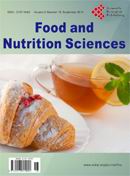 Earlier this year, a nutrition journal retracted an article about the potential dangers of eating food containing genetically modified organisms (GMOs), noting the paper contained a duplicated image.
Earlier this year, a nutrition journal retracted an article about the potential dangers of eating food containing genetically modified organisms (GMOs), noting the paper contained a duplicated image.
At the time, news outlets in Italy were reporting accusations that the last author, Federico Infascelli, an animal nutrition researcher at the University of Naples, had falsified some of his research.
Food and Nutrition Sciences has now updated its initial notice, saying the paper was pulled for data fabrication. In addition, Infascelli is no longer listed on its editorial board – he is included on an archived link to the editorial board from March 2016, but not on the current list of members.
Here is the updated version of the retraction notice for “Gamma-Glutamyl Transferase Activity in Kids Born from Goats Fed Genetically Modified Soybean:”
This paper involves in data fabrication so it does not meet the standard for publication. This article has been retracted to straighten the academic record. In making this decision the Editorial Board follows COPE’s Retraction Guidelines. Aim is to promote the circulation of scientific research by offering an ideal research publication platform with due consideration of internationally accepted standards on publication ethics.
The Editorial Board would like to extend its sincere apologies for any inconvenience this retraction may have caused.
Editor guiding this retraction: Professor Alessandra Bordoni (EiC of FNS)
The statement includes a checklist noting the author engaged in academic misconduct, the results are “overall invalid,” and the probe was initiated by the editor with “hints” from the publisher and a reader.
When we reported on the original retraction in January, we noted it was initiated by hints from Italian Senator and stem cell researcher Elena Cattaneo. According to Il Foglio (using Google Translate), Cattaneo began investigating the research following a debate in the senate on GMOs. Using image analyzing software, she discovered that some of the figures had been manipulated.
The original paper showed modified genes could wind up in the blood and organs of baby goats whose mothers ate GM soybeans.
Hat tip: Enrico
Like Retraction Watch? Consider making a tax-deductible contribution to support our growth. You can also follow us on Twitter, like us on Facebook, add us to your RSS reader, sign up on our homepage for an email every time there’s a new post, or subscribe to our daily digest. Click here to review our Comments Policy. For a sneak peek at what we’re working on, click here.
Thanks for this, Alison McCook. Especially for the link to Dr. Elena Cattaneo, whose work and reputation was new to me. It’s probably outside the RW focus, but I’d like to hear more research about efforts to expose the links between politics and science funding.
Please correct me if I am wrong, but has the RW headline here just falsely reported that the Italian researchers are guilty of a crime (“Fraud”), rather than publishing a paper with “fraudulent” data (i.e., your words: “falsified some of his research” etc)? I can’t speak for the Italians, but in the US the latter is a “crime” only in special circumstances. Is one potential lesson underlying two major cases of litigation (upon which RW has reported) that the right to make [anonymous] observations is tempered by an obligation to be accurate?
Thanks for your comment — the notice specifically uses “fraud” in the reason for retraction, under the checklist: http://file.scirp.org/pdf/FNS_2013061411054679.pdf
It is scientific fraud
The publisher (Scientific Research Publishing) is on Beall’s list of predatory publishers. Is this a sign that they are working on being more reliable?
It’s a sign that they are trying to improve their reputation, at least.
Don’t blame people who do the right thing. Blame them when they don’t do it.
I am not convinced that the journal’s attempt to expunge their record is “doing the right thing”. Remember, the paper had already been retracted, because someone else spotted the recycled material that had slipped past the editors. Now that earlier retraction doesn’t exist any more. The author is no longer on the Editorial Board, gone without trace, never heard of him.
This is not “straighten[ing] the academic record”, this is re-writing it.
This should show that they have a responsible attitude towards the article. While SCIRP is not a great publisher in the academic world and is not a top-ranked publisher, the years have seen some improvement, such as quality control.